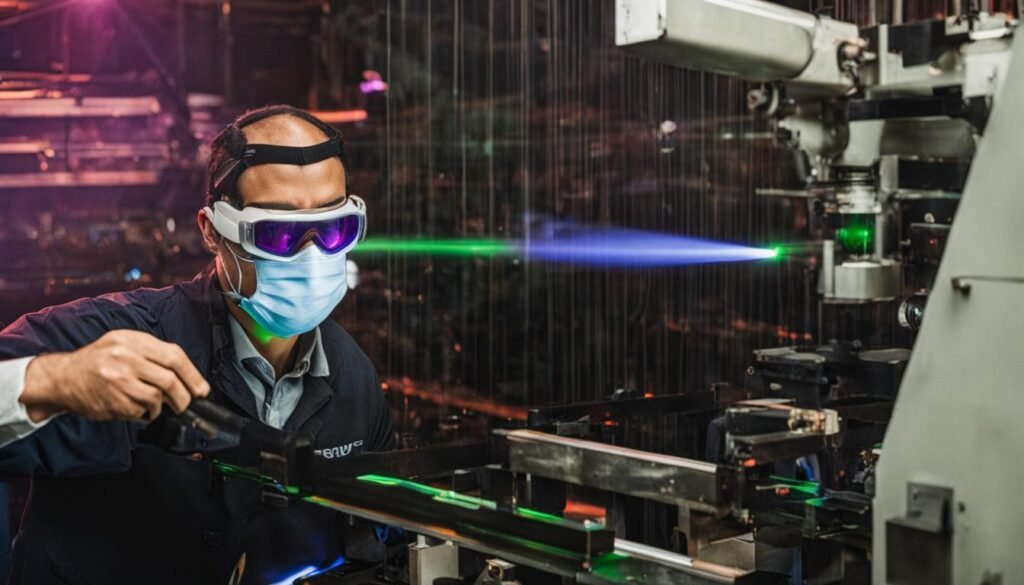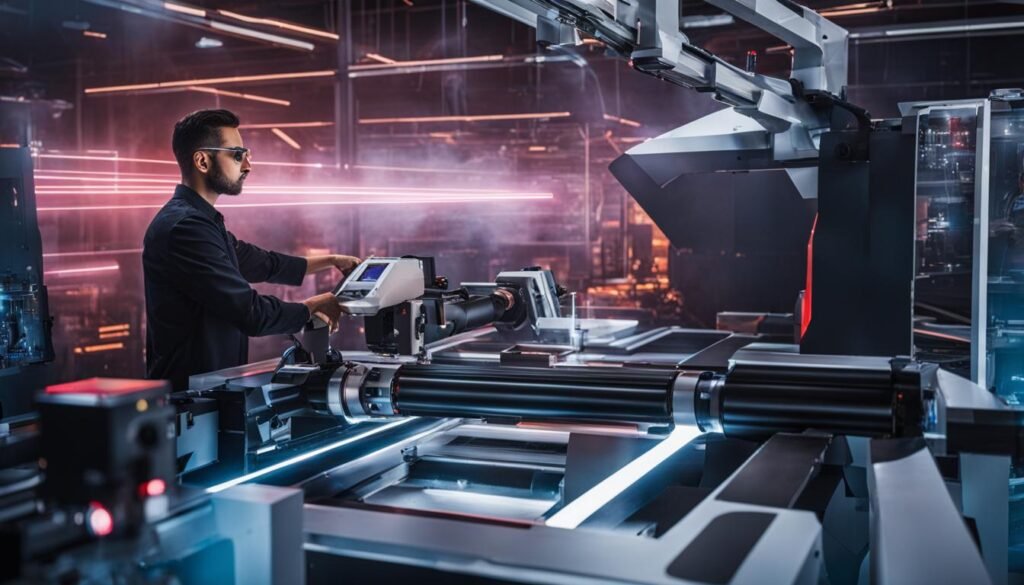Are you passionate about laser technology and looking to take your career to the next level? Consider becoming a laser process development engineer. In this exciting role, you will specialize in making and developing laser devices for various applications. From supervising laser teams to optimizing laser outputs, you will play a crucial role in advancing laser technology and shaping its future.
With expertise in optics and advanced optics, laser process development engineers handle laser-related issues and find innovative solutions. They are responsible for ensuring equipment functionality, troubleshooting any laser-related issues, and continuously improving laser performance. As laser technology becomes more prevalent in industries such as manufacturing, healthcare, and communications, the demand for skilled laser process development engineers is on the rise.
By pursuing a career as a laser process development engineer, you can enjoy a rewarding and fulfilling profession in a rapidly evolving field. With the right education, skills, and hands-on experience, you can advance your career and contribute to the advancements in laser technology.
Contents
- 1 Laser Engineer Responsibilities
- 2 Laser Engineer Skills and Personality Traits
- 3 Laser Engineer Education Requirements
- 4 Laser Engineer Work Environment
- 5 Laser Engineer Salary Range
- 6 Laser Engineer Job Outlook and Industry Trends
- 7 Laser Engineer Career Path
- 8 Conclusion
- 9 FAQ
- 9.1 What does a laser process development engineer do?
- 9.2 What are the responsibilities of a laser engineer?
- 9.3 What skills and traits are important for laser engineers?
- 9.4 What education is required to become a laser engineer?
- 9.5 What is the work environment like for laser engineers?
- 9.6 What is the salary range for laser engineers?
- 9.7 What is the job outlook for laser engineers?
- 9.8 What is the career path of a laser engineer?
- 9.9 How can I advance my career as a laser process development engineer?
- 10 Source Links
Key Takeaways:
- Being a laser process development engineer involves making and developing laser devices for various applications.
- Expertise in optics and advanced optics is crucial for success in this role.
- Laser process development engineers play a crucial role in advancing laser technology and shaping its future.
- With the right education, skills, and hands-on experience, a career as a laser process development engineer can be rewarding and fulfilling.
- As the demand for laser technology grows, the need for skilled laser process development engineers is on the rise.
Laser Engineer Responsibilities
A laser engineer has a wide range of responsibilities, encompassing various aspects of laser technology. One of the major responsibilities of a laser engineer is to supervise a laser team. This involves managing the team’s tasks, coordinating their efforts, and ensuring that projects are completed on time and within budget. Laser engineers also play a key role in the maintenance and repair of laser equipment. They are responsible for ensuring that the equipment is functioning optimally and conducting regular inspections to identify and address any issues.
In addition to team supervision and equipment maintenance, laser engineers are also responsible for monitoring and optimizing laser outputs. They use their expertise to analyze and interpret data, identifying any performance issues and implementing solutions to improve efficiency and output quality. Laser engineers may specialize in advanced optics, working on projects that involve the design and development of optic devices. They collaborate with other engineers and technicians to create innovative solutions and drive the advancement of laser technology.
“As a laser engineer, it is my responsibility to ensure the smooth operation of laser systems and to troubleshoot any issues that arise. I work closely with my team to maintain and repair laser equipment, ensuring that it meets the highest standards of performance and safety. Monitoring and optimizing laser outputs is another crucial aspect of my role, as we strive to achieve the best possible results for our clients. Collaboration and innovation are at the heart of what we do, constantly pushing the boundaries of laser technology.”
Laser Engineer Responsibilities Summary
- Supervising a laser team
- Maintaining and repairing laser equipment
- Monitoring and optimizing laser outputs
- Specializing in advanced optics and optic device development
- Collaborating with engineers and technicians
| Responsibility | Description |
|---|---|
| Supervising a laser team | Managing tasks, coordinating efforts, and ensuring project completion within deadlines and budgets. |
| Maintaining and repairing laser equipment | Ensuring proper functioning, conducting inspections, and addressing any issues. |
| Monitoring and optimizing laser outputs | Analyzing data, identifying performance issues, and implementing solutions for improved efficiency and quality. |
| Specializing in advanced optics | Working on projects involving the design and development of optic devices. |
| Collaborating with engineers and technicians | Driving innovation and pushing the boundaries of laser technology. |
Laser Engineer Skills and Personality Traits
Being a successful laser engineer requires a diverse set of skills and a specific personality profile. Laser engineers need to possess technical proficiency in various areas and demonstrate specific qualities that contribute to their effectiveness in the field. Here is a breakdown of the key skills and personality traits that are essential for laser engineers:
Technical Proficiency:
- Proficiency in MATLAB, data collection, and LabVIEW
- Strong understanding of optics and laser theory
- Knowledge of photonics and laser systems
Analytical Skills:
Laser engineers must have strong analytical skills to solve complex problems and troubleshoot laser-related issues effectively. They need to be able to analyze data, identify patterns, and make sound decisions based on their analysis.
Communication Skills:
Effective communication is crucial for laser engineers as they often work as part of a team and collaborate with colleagues and customers. They must be able to clearly convey technical information, provide instructions, and explain complex concepts in a way that is easily understandable to others.
Creativity:
Laser engineers need to think outside the box and come up with innovative solutions to optimize laser outputs and overcome technical challenges. Creativity allows them to push the boundaries of laser technology and contribute to its advancement.
By possessing these skills and personality traits, laser engineers are equipped to excel in their field and make significant contributions to the development and implementation of laser technology in various industries.

Laser Engineer Education Requirements
Becoming a laser engineer requires a minimum of a bachelor’s degree in electrical engineering, physics, optics, or laser engineering. Some positions may prefer candidates with a master’s degree in these fields. Courses in optics, laser theory, and photonics are beneficial for aspiring laser engineers. Practical experience in the form of internships, apprenticeships, or hands-on lab experience is also important. Laser engineers should stay updated on the latest trends and technologies in the field and possess strong analytical and communication skills.
Below is a breakdown of the education requirements for becoming a laser engineer:
- Bachelor’s degree: A minimum of a bachelor’s degree in electrical engineering, physics, optics, or laser engineering is required. This provides a foundation in the fundamental principles and theories of laser technology.
- Master’s degree (optional): Some positions may prefer candidates with a master’s degree in the aforementioned fields. A master’s degree allows for specialization and in-depth knowledge in specific areas of laser engineering.
- Courses in optics, laser theory, and photonics: Taking courses specifically related to optics, laser theory, and photonics provides a comprehensive understanding of the principles and applications of laser technology.
- Practical experience: Practical experience through internships, apprenticeships, or hands-on lab experience is highly valued in the field of laser engineering. This allows individuals to apply their theoretical knowledge in real-world scenarios and develop practical skills.

“Laser engineers should stay updated on the latest trends and technologies in the field and possess strong analytical and communication skills.”
Staying up-to-date with the latest trends and technologies in laser engineering is crucial for career growth and advancement. It is important to continuously learn and adapt to the evolving field to remain competitive in the job market.
Table: Laser Engineer Education Requirements
| Education Level | Requirements |
|---|---|
| Bachelor’s Degree | Minimum requirement in electrical engineering, physics, optics, or laser engineering |
| Master’s Degree (optional) | Preferably in electrical engineering, physics, optics, or laser engineering |
| Courses | Optics, laser theory, and photonics |
| Practical Experience | Internships, apprenticeships, or hands-on lab experience |
Overall, a combination of education, practical experience, and continuous learning is essential for aspiring laser engineers to succeed in their careers.
Laser Engineer Work Environment
A laser engineer works in a dynamic and diverse work environment, with opportunities in various settings including laboratories, offices, factories, and customer sites. Each work environment offers unique challenges and demands, but all require collaboration and teamwork.
In the laboratory setting, laser engineers are responsible for setting up and testing laser systems, ensuring compliance with safety protocols. They work with precision and attention to detail, as any miscalibration or malfunction could have serious consequences. In this controlled environment, they have the opportunity to experiment, troubleshoot, and optimize laser systems in a safe and controlled manner.
In an office setting, laser engineers design and program laser systems using specialized software and tools. They collaborate with colleagues and customers to understand their requirements and develop custom laser solutions. Additionally, they provide customer support by addressing inquiries, troubleshooting problems, and providing technical guidance.
When working in factories, laser engineers focus on the maintenance, repair, and optimization of laser systems used in manufacturing processes. They ensure that the laser systems are functioning at their optimal capacity and work closely with production teams to minimize downtime and improve efficiency.
“A laser engineer’s work environment is constantly evolving and demands adaptability. Collaboration with a team of engineers and technicians is crucial for success in any work environment.”
Lastly, laser engineers may also work on-site with customers, providing technical support, demonstrating equipment, and assisting with installation and training. This requires excellent interpersonal skills and the ability to effectively communicate complex concepts to a non-technical audience.
| Work Environment | Description |
|---|---|
| Laboratory | Set up and test laser systems, troubleshoot issues, and optimize performance. |
| Office | Design and program laser systems, provide customer support, and collaborate with colleagues. |
| Factory | Maintain, repair, and optimize laser systems used in manufacturing processes. |
| Customer Sites | Provide technical support, demonstrate equipment, and assist with installation. |
Collaboration and Teamwork
A laser engineer’s work environment often revolves around collaboration and teamwork. They work closely with other engineers, technicians, and professionals from different disciplines to successfully design, develop, and implement laser systems. Collaboration enables the exchange of ideas, knowledge, and expertise, leading to innovative solutions and advancements in laser technology.
Teamwork is especially crucial in projects that involve complex laser systems or require interdisciplinary expertise. Laser engineers collaborate with professionals from fields such as electrical engineering, physics, materials science, and robotics, among others. This multidisciplinary approach allows for comprehensive problem-solving and ensures that the final laser system meets all requirements and specifications.
Effective collaboration and teamwork require strong communication skills, as laser engineers must clearly convey ideas, project updates, and technical information to their team members. They must also actively listen to others’ perspectives and incorporate feedback into their work. Collaboration fosters creativity and encourages the exploration of new ideas and approaches, ultimately leading to the development of cutting-edge laser technologies.
Laser Engineer Salary Range
When considering a career as a laser engineer, one important aspect to take into account is the salary range. The average salary for laser engineers is around $72,931 per year. However, this can vary depending on factors such as experience, location, and employer. Salaries for laser engineers can range from $54,907 to $97,143 per year.
The location where a laser engineer works can have a significant impact on their salary. Cities like San Francisco, New York, and Boston typically offer higher salaries for laser engineers due to the higher cost of living and demand for skilled professionals in these areas.
Experience also plays a role in determining salary. Laser engineers with 5 to 9 years of experience tend to earn the highest salaries, while those with fewer than 5 years of experience may earn slightly less. It’s important to note that salary ranges are influenced by various factors and can vary from one employer to another.

Table: Laser Engineer Salary Range by Experience
| Years of Experience | Salary Range |
|---|---|
| 0-2 years | $54,907 – $67,148 |
| 3-5 years | $64,802 – $79,186 |
| 6-9 years | $74,670 – $91,212 |
| 10+ years | $84,535 – $97,143 |
It’s important to note that salary ranges are subject to change and may vary depending on the current job market conditions and economic factors. It’s always a good idea to research the specific industry and location you are interested in to get a better understanding of the salary range for laser engineers in that area.
Laser Engineer Job Outlook and Industry Trends
As the demand for laser technology continues to grow across various industries, the job outlook for laser engineers remains highly promising. The advanced capabilities and applications of lasers are driving the need for skilled professionals in this field. Laser engineers play a crucial role in developing and optimizing laser systems, ensuring their efficiency, safety, and effectiveness in a wide range of industries.
“The job outlook for laser engineers is positive, driven by the growing demand for laser technology in various industries.”
In recent years, lasers have become increasingly compact, precise, and efficient, leading to their widespread use in fields such as manufacturing, healthcare, telecommunications, and research. This trend is expected to continue, creating even more opportunities for laser engineers. According to industry reports, the global laser industry is projected to reach a value of $16.9 billion by 2027, further emphasizing the growing demand and potential career prospects for laser engineers.
“As lasers become more compact and efficient, the need for laser engineers is expected to increase.”
Additionally, advancements in laser technology, such as the development of ultrafast lasers, fiber lasers, and diode lasers, are opening up new possibilities for applications in areas like materials processing, scientific research, and medical treatments. Laser engineers with expertise in these advanced laser systems are in high demand, as they possess the knowledge and skills necessary to operate and innovate in these cutting-edge technologies.
To thrive in the laser engineering industry, laser engineers should stay informed about the latest industry trends, technological advancements, and emerging applications of lasers. Continuous learning and professional development are essential, as the field of laser engineering continues to evolve rapidly. Laser engineers who adapt to new challenges and embrace innovation will find abundant opportunities for growth and career advancement.

Laser Engineer Job Demand by Industry
| Industry | Job Demand |
|---|---|
| Manufacturing | High |
| Healthcare and Medical | High |
| Telecommunications | Moderate |
| Research and Development | High |
| Defense and Aerospace | Moderate |
The table above outlines the job demand for laser engineers in various industries. Manufacturing and healthcare stand out as high-demand sectors, as lasers are widely used in precision cutting, welding, medical diagnostics, and therapeutic treatments. The telecommunications industry also offers moderate job opportunities for laser engineers, particularly in the development of fiber optic communication systems. Research and development, as well as defense and aerospace industries, also require laser engineers to support ongoing technological advancements and innovation.
In conclusion, the job outlook for laser engineers is highly positive, with strong demand across multiple industries. By staying up-to-date with industry trends, honing their skills, and embracing innovation, laser engineers can position themselves for long-term career success in this dynamic and evolving field.
Laser Engineer Career Path
The career path of a laser engineer offers a rewarding and fulfilling journey for individuals with a passion for laser technology. Starting with a bachelor’s degree in electrical engineering, physics, optics, or laser engineering, aspiring laser engineers gain the foundational knowledge and skills needed for their profession.
Practical experience through internships, research assistant roles, or hands-on lab experience is crucial for career advancement in laser engineering. This practical exposure allows engineers to apply their theoretical knowledge to real-world scenarios, develop problem-solving skills, and gain industry-specific insights.
With experience and expertise, laser engineers can progress to more challenging roles in industry or government. They may take on leadership positions, managing projects and teams of engineers. Continuing education and research are essential for laser engineers to stay updated on emerging technologies and advancements in the field.
| Laser Engineer Qualifications | Laser Engineer Progression |
|---|---|
|
|
A successful laser engineer combines their technical expertise with qualities such as leadership, teamwork, and a passion for innovation. Staying updated with the latest trends and technologies, attending relevant conferences and workshops, and networking within the laser engineering community are all valuable for career growth and success.
“Being a laser engineer is a dynamic and evolving profession that offers limitless opportunities for those with the right qualifications and dedication to their craft. From designing cutting-edge laser systems to leading innovative research projects, laser engineers shape the future of laser technology and its impact on various industries.”
Conclusion
A career as a laser process development engineer offers exciting opportunities to work with advanced laser technology and shape its future. Laser engineers play a crucial role in various industries, from designing laser systems to troubleshooting and optimizing their performance. With the right education, skills, and hands-on experience, laser engineers can achieve a rewarding and successful career.
Driven by the increasing demand for laser technology and its applications, the job outlook for laser engineers is promising. As lasers become more compact and efficient, the need for laser engineers is expected to increase. The development of precise and sophisticated laser applications also creates opportunities for laser engineers. Continued professional development and a passion for innovation are key to thriving in this dynamic field.
Starting with a bachelor’s degree in a related field, such as electrical engineering or physics, laser engineers can progress through gaining practical experience and continuing education. Leadership and team collaboration skills are valued as laser engineers often manage projects and work with other engineers. Staying up-to-date with the latest developments in the field is crucial for laser engineers to remain competitive in the job market.
FAQ
What does a laser process development engineer do?
A laser process development engineer specializes in making and developing laser devices for various applications. They are responsible for supervising laser teams, ensuring equipment functionality, and optimizing laser outputs.
What are the responsibilities of a laser engineer?
Laser engineers have a range of responsibilities, including managing a laser team, operating laser equipment, and ensuring its proper functioning. They are also responsible for monitoring and optimizing laser outputs, as well as troubleshooting any laser-related issues.
What skills and traits are important for laser engineers?
Laser engineers should possess skills in MATLAB, data collection, and LabVIEW, along with analytical skills, communication skills, and creativity. These skills and traits contribute to their success in the field of laser engineering.
What education is required to become a laser engineer?
A minimum of a bachelor’s degree in electrical engineering, physics, optics, or laser engineering is required to become a laser engineer. Some positions may prefer candidates with a master’s degree in these fields.
What is the work environment like for laser engineers?
Laser engineers can work in various settings, including laboratories, offices, factories, and customer sites. Collaboration with a team of engineers and technicians is crucial in any work environment.
What is the salary range for laser engineers?
The salary range for laser engineers can vary depending on experience, location, and employer. On average, laser engineers earn around $72,931 per year, with salaries ranging from $54,907 to $97,143 per year.
What is the job outlook for laser engineers?
The job outlook for laser engineers is positive, driven by the growing demand for laser technology in various industries. The field of laser engineering continues to evolve, offering limitless career opportunities.
What is the career path of a laser engineer?
The career path of a laser engineer typically begins with a bachelor’s degree in a related field, followed by gaining practical experience through internships or research assistant roles. With experience, laser engineers can take on more challenging roles in industry or government.
How can I advance my career as a laser process development engineer?
Advancing a career as a laser process development engineer requires continued professional development, staying up-to-date with the latest developments in the field, and demonstrating leadership and team collaboration skills.



